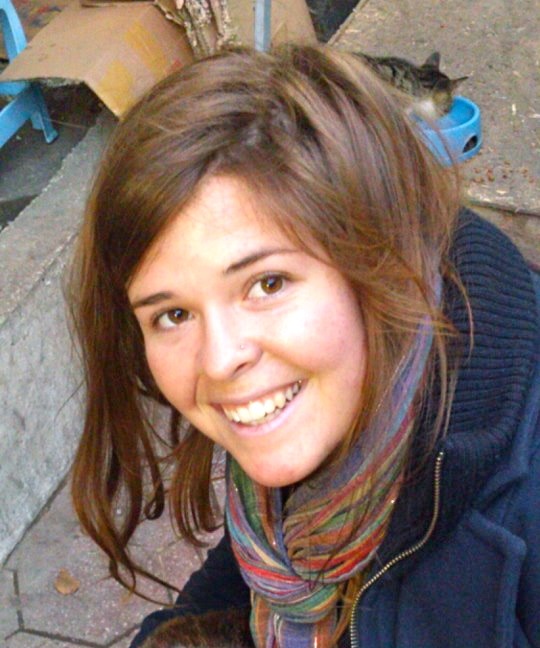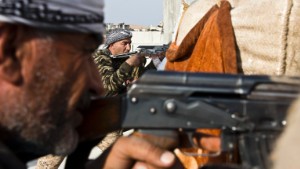American Female Hostage Killed in Jordanian Airstrike, ISIS Claims
Posted 9:24 AM, February 6, 2015, by CNN Wire, Updated at 09:43am, February 6, 2015
Share this:
The Jordanian military has struck hard at ISIS targets in Syria, parts of its efforts to avenge the death of one of its pilots. But did it end up killing an American hostage in the process?
That’s what ISIS said in online posting Friday, claiming that a female American it was holding captive had died in a Jordanian airstrike on its de facto capital, Raqqa. The posting include a picture of a collapsed building that ISIS claimed the woman was being held.
But it did not show her, or provide any proof of her death.
Jordanian Interior Minister Hussein Majali swiftly and firmly knocked down the ISIS report, calling it “another PR stunt by ISIS.”
“They tried to cause problems internally in Jordan and haven’t succeeded,” Majali said. “They are now trying to drive a wedge between the coalition with this latest low PR stunt.”
Previously, ISIS has held a number of hostages from the United States, Britain and Japan. As of now, at least two Westerners were thought to be in its custody: British journalist John Cantlie, who has appeared in a number of ISIS-produced videos, and an American woman who is a 26-year-old aid worker.
Most of ISIS’s hostages have been executed by the terror group, which then touted the grisly deaths online.
That was the case for Jordanian pilot Lt. Moath al-Kasasbeh, who was captured by the Islamist extremist group after his F-16 fighter jet crashed while on an anti-ISIS mission near Raqqa. Video emerged Tuesday of ISIS burning him alive, outraging Jordan and others around the world.
Yet, while that video only came out this week, Jordanian officials said later that have reason to believe al-Kasasbeh was actually killed in early January. In the interim, ISIS had suggested that he was still alive while signaling its openness to a prisoner exchange with Jordan.
Jordan executed two jihadist prisoners in retaliation on Wednesday.
Pilot’s death stirs outrage
The Jordanian pilot’s death, and the horrific manner in which it happened, spurred outrage in Jordan and beyond.
Safi al-Kasasbeh, Moath’s father, called on Jordan and its allies to “annihilate” ISIS. Government officials appear, at least in their rhetoric, determined to do just that.
“(Jordan will extract) revenge that equals the tragedy that has befallen the Jordanians,” government spokesman Mohammad al-Momani said.
Jordan began that process Wednesday, executing the two imprisoned jihadists. The next day, it launched its first strikes since the news emerged about al-Kasasbeh.
The late pilot’s father said that King Abdullah II told him 30 Jordanian warplanes participated in Thursday’s action, which were focused in and around Raqqa.
It wasn’t immediately clear how many jets took part in Friday’s airstrikes, or what they managed to achieve. The anti-ISIS activist group, “Raqqa is Being Slaughtered Silently,” reported warplanes in that Syrian city as well as loud explosions, releasing a photo of dark smoke rising above.
At the very least, the latest strikes prove that Jordan’s mission, dubbed “Moath the Martyr,” is not a one-day affair.
Sermonizing against ISIS, supporting the fight
Until now, ISIS hasn’t shown any inclination to back down. Just the opposite, in fact: The terror group has been relentless and brutal in its quest to establish a vast caliphate under its strict, twisted version of Sharia law.
The organization’s savagery seemingly knows no bounds, not only in its use of captives’ killings as grisly propaganda tools but in its campaign of mass killings, rapes, kidnappings and other atrocities while taking over swaths of Iraq and Syria.
Just this week, a U.N. report claimed ISIS has stepped up its use of children in its bloody campaign, even putting price tags on some and selling them as slaves.
Al-Kasasbeh’s killing was an attempt by ISIS “to instill terror and fear in the hearts of its enemies,” making them less willing to provoke or put up a fight, says a prominent Sunni Muslim cleric who has been exiled from Syria.
“What’s happening is the opposite,” Shaykh Muhammad al-Yaqoubi told CNN’s Christiane Amanpour this week. “The martyrdom of Moath has united Muslims … against ISIS, leaving no slight room of doubt that these people do not represent Islam. They represent savagery, terrorism and extremism.”
That seems to be the sentiment in Jordan, at least, where citizens rallied again Friday in Amman to honor al-Kasasbeh and condemn his killers.
Thousands filled the King Hussein Mosque there, listening to a sermon decrying ISIS as antithetical to Islam and insisting that Muslims cannot stand idly by.
After prayers, crowds spilled out onto the streets to march calmly and defiantly toward Palm Square. Many held up banners and signs — including Queen Rania, with a poster that read, “Moath, the martyr of justice” — and chanted, “Long live the King.”
‘We are upping the ante’
Such public support for the effort to destroy ISIS is significant in the Middle East, given the terrorist group’s stated goal of establishing a pure Islamic state and the fact the United States is leading the international coalition fighting against it.
For weeks, Jordan had been one of a handful of nations in the region taking part in the U.S.-led fight.
That campaign is continuing, with the U.S. military announcing Friday — apart from Jordan’s own actions — nine airstrikes targeting ISIS tactical units and fighting positions near the northern Syrian border city of Kobani and another strike of storage and staging facilities in Hasakah.
Also, in Iraq, Kurdish and Iraqi fighters on the ground are getting help from their coalition partners in the air. Between 8 a.m. (midnight ET) Thursday and Friday, local time, the American military reported eight airstrikes on five Iraqi locations.
Still, Jordan has come to the fore among coalition members in its pursuit of ISIS. And that doesn’t seem likely to change anytime soon.
The armed forces promised Thursday on state TV that “this is just the beginning.”
“We are upping the ante,” Jordanian Foreign Minister Nasser Judeh told CNN. “We’re going after them wherever they are, with everything that we have.”




 Reply With Quote
Reply With Quote
 Kayla Mueller, an aid worker, was held by the terror group ISIS.
Kayla Mueller, an aid worker, was held by the terror group ISIS.  Mueller Family
Mueller Family Queen Rania was among thousands to take to the streets of Amman
Queen Rania was among thousands to take to the streets of Amman  Many of those rallying carried images of the murdered pilot
Many of those rallying carried images of the murdered pilot  Lt Moaz al-Kasasbeh had been held hostage since his plane came down on 24 December
Lt Moaz al-Kasasbeh had been held hostage since his plane came down on 24 December 
 Jordanians attend the Muslim Friday prayers, surrounding posters of slain Jordanian pilot, Lt. Muath al-Kaseasbeh taped on a light pole, ahead of an anti-IS group rally in Amman, Jordan, Friday, Feb. 6, 2015. Several thousand people marched after Muslim Friday prayers in support of King Abdullah II's pledge of a tough military response to the killing of the pilot. Arabic on the posters reads, "Muath is the martyr of the right, Jordan's eagle, to heaven, the country's martyr."
Jordanians attend the Muslim Friday prayers, surrounding posters of slain Jordanian pilot, Lt. Muath al-Kaseasbeh taped on a light pole, ahead of an anti-IS group rally in Amman, Jordan, Friday, Feb. 6, 2015. Several thousand people marched after Muslim Friday prayers in support of King Abdullah II's pledge of a tough military response to the killing of the pilot. Arabic on the posters reads, "Muath is the martyr of the right, Jordan's eagle, to heaven, the country's martyr."



Bookmarks